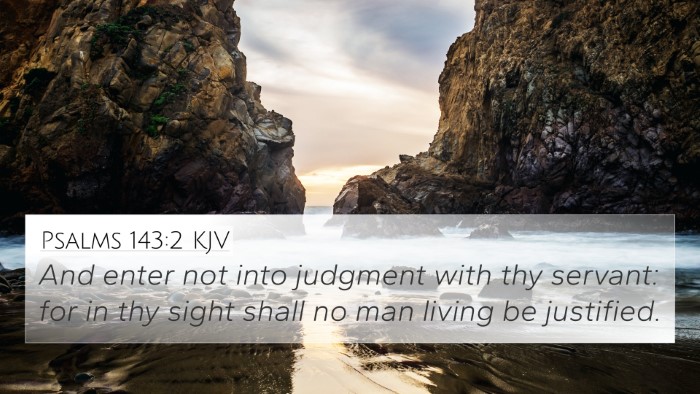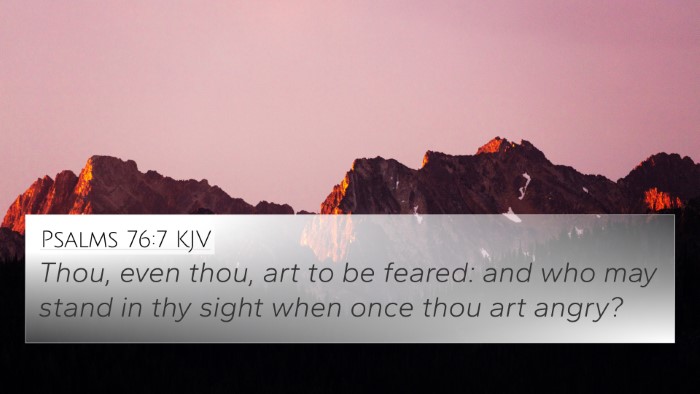Psalms 130:3 - Commentary and Interpretation
Verse: "If thou, LORD, shouldest mark iniquities, O Lord, who shall stand?"
Overview: Psalms 130 is a penitential psalm expressing deep repentance and a longing for God's mercy. Verse 3 emphasizes human sinfulness and the reliance on God’s grace for salvation.
Meaning and Insights
This verse raises a critical theological question about human morality in relation to God's holiness. It emphasizes the need for divine forgiveness and highlights the importance of humility in approaching God.
Matthew Henry's Commentary
Henry explains that this verse acknowledges God’s omniscience and justice. He posits that if God were to keep an account of our sins, no one would be able to withstand His judgment. The psalmist expresses desperation, recognizing that the only hope lies in God’s mercy.
Albert Barnes' Commentary
Barnes notes that the essence of this verse is about the acknowledgment of sin. He reflects on the condition of humanity—if God were to take into account every transgression, there would be no chance for anyone to stand upright before Him. The plea for mercy indicates a relationship of dependence on God’s forgiveness.
Adam Clarke's Commentary
Clarke emphasizes the concept of iniquity and the weight of sin. He discusses the gravity of the question posed in the verse, suggesting that recognizing our shortcomings is crucial for approaching God. Clarke points out that without God’s lovingkindness, humanity is lost.
Theological Implications
The verse challenges believers to reflect on their relationship with sin and the nature of God’s forgiveness. It illustrates a deep understanding of grace—that despite humanity's failings, there is hope in God’s mercy.
Bible Verse Cross-References
Understanding Psalms 130:3 can be enriched by exploring related scriptures:
- Romans 3:23: "For all have sinned, and come short of the glory of God."
- Isaiah 53:6: "All we like sheep have gone astray; we have turned every one to his own way."
- Micah 7:18-19: "Who is a God like unto thee, that pardoneth iniquity..."
- Ephesians 2:8-9: "For by grace are ye saved through faith..."
- 1 John 1:9: "If we confess our sins, he is faithful and just to forgive us our sins..."
- Psalms 32:1-2: "Blessed is he whose transgression is forgiven, whose sin is covered."
- Hebrews 4:16: "Let us therefore come boldly unto the throne of grace..."
Connections between Bible Verses
This verse from Psalms can be connected with many teachings throughout the Bible, pointing towards the overarching theme of redemption and God’s mercy:
- Romans 5:8: "But God commendeth his love toward us, in that, while we were yet sinners, Christ died for us."
- Colossians 3:13: "Forbearing one another, and forgiving one another..."
Cross-Referencing Biblical Texts
The practice of linking Bible scriptures allows believers to gain a comprehensive understanding of spiritual themes. The theme of mercy and forgiveness spans both Old and New Testament texts. Psalm 130:3 elucidates the principle of acknowledging sin, which resonates throughout the Scripture, indicating a thematic unity in God’s approach to human fallibility.
Thesis on Cross-Referencing
Utilizing Bible cross-reference tools can greatly enhance one’s study and understanding. These tools lead to a detailed exploration of various themes and demonstrate how certain verses can interpret and clarify one another.
How to Use Bible Cross-References
To understand Psalm 130:3 in depth, one can employ several methods:
- Bible Concordance: A concordance can list key terms to facilitate locating related verses.
- Cross-Reference Bible Study: Engage with related verses to draw parallels and contrasts.
- Bible Reference Resources: Utilize reference materials that group verses by themes.
- Bible Chain References: Follow biblical themes as they flow through different texts.
Conclusion
Psalms 130:3 encapsulates the profound truth that humanity is inescapably in need of divine mercy. The insights drawn from Matthew Henry, Albert Barnes, and Adam Clarke reinforce the necessity of acknowledging our iniquities before God. The theological implications resonate throughout Scripture, encouraging believers to seek God's grace with humility.
As we study this verse and cross-reference it with others, we gain a clearer understanding of God's nature and our role in His salvation plan. These connections not only enrich our theological comprehension but also shed light on our individual walk of faith.














